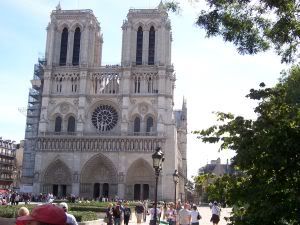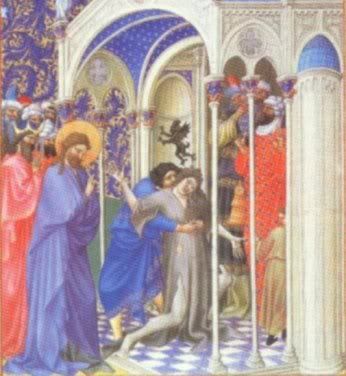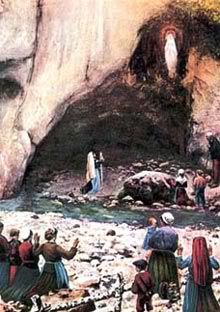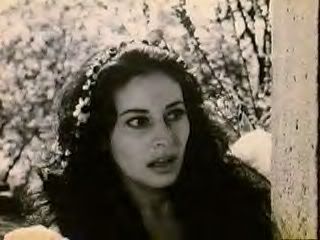Part 3
While rising from Purgitory, toward the heaven of the moon, Dante wonders how they can enter the pearl-like substance. It is a mystery, "like the union of divine and human nature in Christ." Dante than asks how it is that the moon, a perfect heavenly body, has spots. Beatrice answers that the distribution of the intelligence which governs each body varies in different places. She then gives him an experiment to perform which confirms this revelation. The important point is that here knowledge is coming from both faith and reason (revelation and experiment). Since this is an occasion in which sense data will suffice, experiment will confirm what faith has already taught. Beatrice praises experiment as the fountainhead of the arts, "From this objection may experiment deliver thee, if thou its virtue try, (Source where from stream the arts that you invent)." (Paradiso, Canto II. 4-6. Thus, Dante forms the perfect bridge between medieval and early modern, he forms perhaps the greatest literary expression of the medieval cosmos just before the transition into a scientifically defined universe. The Comedy also represents one of the last great artistic expressions of the valuation of nature in relation to the divine, the exaltation of grace over nature.
The dissolution of the unity began in the middle of the twelfth century, when a dispute arose over the independence of science from classical learning and tradition. This dispute set science on the road to mathematical precision, and to the view that the universe must be viewed as a dynamic system, no longer described in traditional ways. But, with the rise of Renaissance humanism, the exaltation of nature over grace begins. A comparison between Dante and Pico Dela Mirandola demonstrates how far the change had gone. Dante's Virgil is willing to remain silent in matters pertaining to revelation. The Comedy is a perfect description of the medieval cosmos, complete with the ontological relation of nature and grace. Human nature is exalted by grace, but human aspiration is in line with divine will. Thus, when Dante asks if those trapped in the heaven of the moon don't long for a higher state, he is told, "brother, the virtue of love hath pacified our will; we long for what we have alone, nor any craving stirs in us beside. If we desired to reach a loftier zone, our longings would be all out of accord with His will..."(Par. Canto III. 70-74). With Pico's oration "On the Dignity of Man," however, the notions of the Microcosm and Macrocosm are extended to their logical humanistic conclusions. These themes emerged out of the ontology of supernature, but with Pico, "there is nothing to be seen more wonderful than man." All the choice is with humanity. "He [God] took man, a creature of indeterminate nature...and addressed him thus,...`thou constrained by no limits, in accord with thine own free will, in whose hand we have placed thee, shall ordain for thyself the limits of thy nature.'" In the medieval ontology, humanity is fallen in will, but a spark of the Imago still resides in human nature, which bestows rational reason and spiritual love, and thus, grace can exalt and perfect human nature. With Pico's Renaissance humanism, humanity is set no limits, can choose for itself to rise to the heavens or sink to the earth. Humanity determines its own nature.
This exaltation of nature over grace grew until, almost four centuries latter, a new valuation of nature emerges, independent of grace. The old relation of nature and grace was rejected, identified too closely with scholasticism. The Reformation, while preserving the relationship between God and the world (immanence and transcendence, God's grace present in the world) Luther removed the centerpiece form the system. For Luther, humanity was not "God-capable." A whole new relationship between nature and grace was forged, one based on sheer volunterism and equivocity (the unlikeness of creature and creator). Equivocity, for Luther, is based primarily upon the doctrine of the fall. He assumed that the act of sin had completely destroyed the image of God in which humanity was originally created. By the 16th century a new feeling for nature was forming. People wanted to own the world they had discovered, to feel comfortable in their new relationship with nature. Humanism marked a total rejection of scholasticism, the relation of nature and Grace was almost reversed. Thus, Fontenelle's Marquise, when asked "did you not have a more grandiose conception of the universe?" replies, "well, I hold it in much higher regard...now that I know its like a watch..." There was a trend toward the diestic view of a God "out there." The older view Fontenelle describes as "...a false notion of mystery wrapped in obscurity. They only admire nature because they believe she's a kind of magic."
Newton and Boyle, having totally rejected scholasticism, in the last quarter of the 17th century, nevertheless maintain an ordered relation between God and the universe. Newton's sensorium of God, which explained "action at a distance" involved in gravity (his private explanation) was taken directly from the work of 14th century scholastics (Thomas Bradwardine and Nichole Oresme) who identified God with space itself. "Despite the virtuosi's sustained and vigorous denounciation of scholastic philosophy, they heavily upon the medieval heritage in their use of teleology...they combined the mechanical view of nature with the medieval conception that nature is the product of divine goodness." Newton and Boyle were at pains to explain God's activity in a mechanical universe, but, as Brooke says, "for latter generations less tolerant of paradox, less tolerant of things above reason, less tolerant of a realm of grace above a realm of nature, a clockwork universe demanded nothing more than an original clockmaker." D'Alembert said that one could understad the existence of God though natural reason, but he went on to say that scholastic ontology was superstition. Nature was valued in its own right, but as a separate piece of machinery, divorced from divine valuations and grace. For Newton and Boyle, grace was not so much completing nature, as it was propping up their cosmologies. In a sense, nature was completing grace.
The supernatural ontology ceased to be important to scientific explanation, not only because it ceased to inform the scientific method, but also because cultural values had as much to do with the process as did scientific method. Scientists could have continued to understand the God-world relationship as an important completion of scientific understanding (as indeed they did until well into the 18th century). But, the cultural value of autonomy changed the way in which "higher" explanations were connected to the causal world. Rather than the immanent God who worked through supernature, dietic thinkers, and philosophes in the enlightenment, came to value the for itself apart from God, and to view God as the absent God who wound up the universe and left it to run on its own.
When historians of science, such as Grant, Lindberg, and White, argue that Christian belief helped to spur the development of science in the middle ages, their accounts of those developments are incomplete as long as they ignore the supernatural ontology. White attributes the interest in science to developments in natural theology, but an understanding in natural theology is incomplete as long as it ignores the supernatural ontology upon which the whole foundation of natural theology was built. The 12th century developments above describe the rise of natural theology. Moreover, White explains the interest in natural theology merely as an attempt to "understand God's mind by examining his creation. Clearly, there is much more to the rise of natural theology. It was not only attempt at understanding God through creation (that attempt was made in using nature as a symbol of the divine). There was an actual value of nature which went into the process. The conception of nature as a whole, the notion of the Universitas, had given rise to an appreciation of nature in its own right. That was made possible by the value bestowed upon nature through its intimate connection to the divine, the harmony between immanent and transcendent. Grant argues that harmony between science and theology existed in the 12th century because theologians were trained in both natural philosophy and natural theology. True enough, but there must have been a reason why they were so trained. Grant suggests that the reason is because, being trained in both, they knew how to relate the two disciplines. On the other hand, there must be more to it than mere lack of professional jealousy. Why were they trained in both? Because, they saw both as an inter-related whole. Nature was valued "in its own right," but not as an autonomous piece of clock-work which with no relation to grace. They understood the valuation of nature as an extension of grace, nature was valued in its own right because it was the creation of a God who was immanent, as well as transcendent, and who gave nature theological significance.
_________________________________________
Bibliogrophy and End Notes_________________________________________
PARTIAL BIBLIOGRAPHY
Augustine. The City of God. translated Henry Bettenson. Penguin Books, 1972. This edition 1984.
Bingen, Hildegard von. Hildegard of Bingen's Book of Divine Works: With Letters and Songs. ed. Matthew Fox. Sante Fe, New Mexico: Bear and Company inc. 1987.
Brooke, John Hedley. Science And Religion: Some Historical Perspectives. The cambridge history of Sciences Series. Cambridge, New York: Cambridge University Press, 1991.
Charlton, D. G. New Images of The Natural: A Study In European Cultural History, 1750-1800. The Gifford Lectures, London: Cambridge University Press, 1884.
Chenu, Marie-Dominique. Nature, Man, Society in The Twelfth Century. Wehic Press, 1979.
D'Alembert, Preliminary Discourse to the Encyclopedia of Diderot. Trans. Richard Swab. The library of liberal arts series, Bobbs Merrill company, 1963.
Dante. The Divine Comedy. Trans. Lawrence Binyon, ed. Paolo Miano, New York: Viking Press, 1947.
Fairweather, Eugene R. "Christianity and The Supernatural," in New Theology Number One. Martin E. Marty and Dan G. Peerman, ed., New York: The Macmillian Company, 1964.
Fontenelle, Bernard le Bovier. On The Plurality Of Worlds. trans. H. A. Hargraves. Berkeley: University of California press, 1990.
Grant, Edward. "Science and Theology in The Middle Ages," in God and Nature: Historical Essays ON The Encounter Between Christianity and Science. ed. David Lindberg and Ronald L. Numbers., Berkeley: University of California Press, 1986.
Inge, William Ralph. Christian Mysticism. the famous Bampton Lectures, Oxford, 1899, New York: Meredian, Living Age Books, 1956, second printing, 1960.
L Ladurie, LeRoy. "Introduction," Montaillou: Promised Land of Error. trans. Barbara Bray, New York: George Braziller, Inc. 1978 (American pub. date, originally 1975).
Lindberg, David "Science and The Early Church," in Lindberg, Op. Cit. . Science In the Middle Ages. Chicago: University of Chicago Press, 1978.
Lovejoy, Arthor O. The Great Chain of Being: The History of An Idea. The William James lecture 1833, Cambridge: Harvard University Press, 1934. This edition 13th printing 1976.
Lloyd, Genevieve. The Man of Reason: "Male" and "Female" in Western Philosophy. Minneapolis: University of Minnesota Press, 1984.
Marcus, R. A. Christianity In The Roman World. New York: Charles Scribner's Sons, 1974.
Pelikan, Jaroslav. The Christian Tradition: A History of The Development of Doctrine. The Growth of Medieval Theology (600-1300). Vol. III. Chicago: University of Chicago Press, 1978.
Ruther, Rosemary Radord. Sexism in God-Talk: Toward a Feminist Theology. Boston: Beacon Press, 1983.
Scheeben, Mathias Joseph. Nature And Grace. trans. Cyril Vollert, ST. Louis:Herder Book Company, 1954 (originally 1856).
Schiebenger, Londa. The Mind Has No Sex? Women in The Origins of Modern Science. Cambridge: Harvard University Press, 1989.
Tanner, Kathryn. God and Creation In Christian Theology: Tyranny or Empowerment. Basil Blackwell, 1988.
Tillich, Paul. A History of Christian Thought. ed. Carl Bratten. New York: Simmon and Schuster, 1968.
Westfall, Richard. Science and Religion in Seventeenth Century England.
Ann Arbor paperbacks: University of Michigan Press, 1973 (originally, 1958).
Willey, Basil. The Seventeenth Century Background: STudies in The Thought of The Age In Relation to Poetry and Religion. London: Chatto and Windus, 1934, seventh impression, 1957.
White, Lynn. "The Roots of Our Ecological Crisis," in Machina Ex Deo: Essays in The Dynamism of Western Culture. Cambridge, Massachusetts: MIT Press, 1968.
End Notes
1 The term "supernature" simply refers to the concept of the supernatural. But, that concept is much changed in modern parlance. The term first originated with Pseudo-Dionysius around 500 CE. In modern terms it refers to anything wired, or beyond the normal course of cause and effect; the occult, psychic powers, and so on. In scholastic terminology, however, it is two things: the realm of the transcendent (or God's presence beyond the created order), or the power to God to alter the natural and bestow grace. Miracles, for example, are "supernatural effects." To say that supernature is the ground and end of nature is simply to say that God is the origin of the nature, and whatever goal or purpose is fulfilled in creation, it is fulfilled to the extent that it moves toward God's purpose. This could be a moral goal, it doesn't have to be a physical effect, because "nature" includes human nature (and primarily human nature in scholasticism). Supernature is the higher law, rooted in God's will and grace (power). see Fairweather and Scheeben.
2 Eugene R. Fairweather, "Christianity and the Supernatural," in New Theology N0. 1. Martin E. Marty and Dean G. Peerman, ed. (New York: The Macmillian Company, 1964), 237.
These are Fairweathers terms; the analogical ontology, which is juxtaposed to the "equivocal" and "univocal" views. The equivocal representing the reformed and neo-orthodox theology, the univocal representing enlightenment based liberal theology. Admittedly, Fairweather's schema is too Thomistic to be accurate, but his terms are handy descriptions of concepts which take a long time to lay out, so I use them. He speaks of the harmonious relation of immanence and transcendence as "analogical" on the assumption that religious language is merely analogy. Since the transcendent is beyond word, thought, or image, the most we can ever hope for is an analogical relation, or pure mystical experience. Of course, there is nothing to guarantee the accuracy of the analogy. But, in contrast to the other two views, the idea is that rather than losing the supernatural in the natural (which includes the materialist view as well as most liberal theology) and rather than losing the relation of nature to grace through sheer volunterism (which the reformers substituted for creative purpose in their notions of soverginty), what for Fairweather is the "correct" view, maintains some relation between creature and creator, even if we can only know that relation through analogy.
3 Fairweather, 245-253.
Fairweather traces the notion of supernatural from the early days of the Church to modern times, in summary fashion. He emphasizes the Greek, Augustine, Aquinas, the Reformers, and Paul Tillich. He argues specifically against the denigration theory.
4 Fairweather, p. 237.
5 White, 86.
6 Ibid., 88.
7 Rosemary Radford Ruther. Sexism in God-Talk: Toward A Feminist Theology. (Boston: Beacon Press, 1983), 54.
Ruther argues that in religious thinking of the West the association is always between the female, the earth, nature, and the mother goddess, the male associated with the sky, heaven, transcendence, and the sky father. Thus, transcendence is the longing of the male ego to survive, and is rooted in the warrior culture and its tendency to force young boys, when coming of age, to flee the "world of women" and join the men.
8 Ibid.
9 Schiebinger, 162.
10 Lovejoy, 103.
11 Ibid.
12 Fairweather, 327.
13 Schiebinger, 1969.
"Augustine had asserted that both sexes, having been created in the image of God, posses a rational soul (though woman's rationality was of a lesser degree). While woman might be inferior to man by nature, she was his equal by grace: in the afterlife souls have no sex..." She footnotes Eleanor Mclaughlin "equality of souls, inequality of sexes" in Religion and Sexism, Images of Women in The Jewish and Christian Traditions. ed. Rosemary Ruther. New York: 1974, 218. On the other hand, see Genevieve Lloyd. The Man of Reason: "Male" and "Female" in Western Philosophy. Minneapolis: University of Minnesota Press, 1984. 29. Lloyd argues that Augustine was stuck with the baggage of Genesis, and was forced to explain woman's difference in creation in terms of subordination, but he tried to explain it in such a way as to correct the denigration of women. "His own interpretation of the sexual symbolism of Genesis is clearly supposed to defend woman against what he perceived as the misogynism of earlier exegesis...Augustine attempted to articulate sexual equity with respect to reason, while yet finding interpretive content for the Genesis account subordination of woman to man...what woman is as a rational spirit [not necessarily after life] must be distinguished from what she symbolizes in her bodily difference from man." What she symbolizes is human reason diverting toward the practical, Lloyd argues, not the lack of reason, or less reason. While this answer is unworthy of a thinker of Augustine's stature, he could hardly have picked up a better one at Woodstock.
14 Evelyn Underhill. Mysticism. (New York: Meridian books, 1955) originally published 1911. 206.
15 Lindberg, Science in Middle Ages, 42.
16 Ladurie, viii. 17 Lindberg draws upon Weber at this point, to explain the economic developments and religious attitudes toward those developments in the 10th through 12th centuries. Science In The Middle Ages, 29-42. Unfortunately, Lindberg does not explain exactly what those theories are, or how they really explain the developments. He simply says that economic forces drove religious attitudes. Fortunately, I used to be a sociology major. Weber was one of my favorites. In The Spirit of Capitalism and the Protestant Work Ethic he says that the protestant reformation prepared the ground for capitalism by instilling an ethical base thorough religious attitudes. The same set of sensibilities required to be a good Calvinist, were also those required to be a good capitalist. His theory was also wider, and he applied it to many periods of history. Lindberg seems to be arguing that religious attitudes and economic developments were mutually reinforcing and laid the groundwork for the rise of medieval science in the 12th century.
18 Ibid., 25.
19 Ibid., 23.
20 Ibid., 27.
21 R. A. Markus. Christianity In The Roman World. (New York: Charles Scribner's Sons, 1974), 60.
22 Fairweather, 247
23 Fairweather, 248
24 ST. Augustine, The City of God. Trans. Henry Bettenson, Penguin Classics (London: Penguin Books Ltd., 1972/84) Book XII, Chapter 4.4, p. 475.
25 Ibid., 473-4.
26 David C. Lindberg, God and Nature: Historical Essays on The Encounter Between Christianity and Science. ed. David C. Lindberg and Ronald Numbers, (Berkeley: University of California Press, 1986), 31.
27 Lindberg, 35.
Augustine didn't really make any contributions to the development of science, but Lindberg numbers him among the "early church practitioners" of science. Augustine did apply scientific thinking on occasion. He used the example of twins to counter astrology; both babies are born under the same sign, at the same time, but one is often weaker and meets a different fate than the other.M
28 Lindberg, 37.
29 Arthor O. Lovejoy. The Great Chain of Being. The William James Lectures, 1933,(Cambridge: Harvard University Press, 1934), 67.
30 Grant, 50-51.
31 D.G. Charlton. New Images Of The Natural In France: A Study in European Cultural History, 1750-1800. The Gifford Lectures (New York, London: Cambridge University Press, 1984),35.
32 Paul Tillich. A History of Christian Thought. ed. Carl E. Braaten, (Simon and Schuster: Touchstone, 1967), 154.
33 Lindberg, Science in The Middle Ages. 42 35 Ibid.
Lindberg includes as magic, of course, the supernatural and the sacraments. From an anthropological view this is quite correct, but his inclusion of miracles is conceptually wrong. Miracles and magic are not the same thing, not simply because Christian belief (the Bible for example) condemns one and condones the other, but because they stem from two different concepts. Magic seems to be based on the ultimate premise that some force built into nature can be controlled by the user. For example, with the Hermetic corpus, there is a certain design which the ancients knew of that allows for the control of nature in a certain way. Miracles, on the other hand, or "supernatural effects" as Scheeben calls them, are not the result of the user's control, but of God's will. Moreover, they are not brought into play by some hidden design within nature, but by the orchestration of supernature; that is, they are the laws of nature obeying a higher law which is evoked at God's choosing. From an anthropological view this may be hair splitting, but from within the inner logic of a theological tradition it makes a large difference. Be that as it may, Lindberg's basic point still stands, by allowing the infusion of pagan magic, which is obvious in some respects, if not in the sacraments, Christianity allowed a combination of traditions which emerged as science in the Renaissance.
36 Edward Grant, "Science and Theology IN the Middle Ages." in Lindberg, God And Nature. 49.
37 In his famous lectures, the Bampton lectures (Oxford, 1899) on Christian mysticism, William Ralph Inge speaks of "medieval dualism" of spirit over matter. This is in contradiction to Fairweather, Tanner, and others. Nevertheless, even though the lectures were given at the turn of the century, Inge has been considered the major authority on Christian mysticism thoughout most of the 20th century. Inge does go on, however, to state that the view of the more developed mystics was toward the notion of harmony and unity. Christian Mysticism, 263. He also states, "all nature [for Christian mysticism] (and there are few more pernicious errors than that which seperates man from nature) is the language in which God expresses his thoughts," 250. Inge has long been one of my favorites, so I feel in all honesty I must admitt that this compromises my argument. But, I still think there is an idea here, so I have tried to qualify my argument (I'm tweeking it). After all, who wants to be an ideologue?
38 Lauderie shows that the Manachiean influences in France fed into the Cathari dualism, which did disvalue the natural world. Like some forms of gnosticism from the early centuries, this did not always take the form of asceticism, it sometimes meant licence to sin (we are trapped in matter anayway, so why avoid sex?). The Cathori had two levels of believer, (as did the Manachieans) the "perfects," or elites, abstaned, the ordinary people (peasants mostly) did not abstaine, but indulged at an almost alarming level.
39 Ibid., 34.
40 Ibid., 35.
41 Chenu, 29.
42 Lindberg, Science in The Middle Ages, 37.
43 Ibid.
44 Ibid., 30.
45 Schiebinger, 13.
46 Underhill, 458.
47 M.D. Chenu. Nature, Man, and Society in The Twelfth Century: Essays on New Theological Perspectives in The Latin West. ed. and trans. Jerome Taylor and Lester K. Little, (Chicago, London: University of Chicago Press, 1957). 35.
48 White, 88
49 Inge, 250.
50 Fairwether, 237.
51 Hilegard of Beingen's Book of Divine Works: With Letters And Songs. ed. Matthew Fox, Santa Fe, New Mexico: Bear and company Inc. 1987, 26.
52 Mary Jeremme Finnegan. The Women of Helfta: Scholars and Mystics. (Athens, GA: University of Georgia Press, 1991).
53 Tillich, 144.
54 Tillich, 181-82.
55 Lawrence Cunningham. ed. Brother Francis. Huntington, Indiana: OSV, 1972. Cunningham argues that ST. Francis did not idealize or romanticize nature..the "nature mystic" image is fallacy. St. Francis was more of a democratic than a romantic, that is, he accepted all of God's creatures on an equal basis, but he did not divinize nature.
56 get it
57 Tillich, 181-82.
58 M.D. Chenu. Man, Nature, and Society In The Twelfth Century: Essays On New Theological Perspectives In The Latin West. ed. trans. Jerome Taylor and Lester K. Little, (Chicago: University of Chicago Press, 1957, 1968 edition), 4-6.
59 Chenu, 6.
60 Ibid., 9-10.
61 Ibid.
See also Grant, 51. Grant gives the same developments of Platonic philosophy leading the search for natural causes, lists the same names, but with less development, he even includes another part of this same larger quotation from William of Conche.
62 Lindberg, Science in The Middle Ages, 41-42.
63 Chenu, 16-17.
64 Chenu, 28.
65 Chenu, 18.
66 in Chenu, 19.
I thought I would quote the expression of such a modern concern, cheap energy. 67 Chenu, 29.
68 Ibid.
69 Ibid.
70 Chinu, 32-33.
71 Ibid., 33.
I could as easily footnote Lindberg's Science In The Middle Ages, and Grant, as both go hand in hand with Chenu on almost every point, concerning the developments at Chartres, but their accounts are much more general.
72 Chenu, 32.
73 Jarslov Pelikan. The Christian Tradition, a Development of The History of Doctrine: The Growth of Medieval Theology, (600-1300). Vol. III. (Chicago and London: University of Chicago Press, 1978), 284-85.
74 Ibid.
75 Aquinas in Pelikan, Ibid.
76 Ibid.,288.
77 Pelikan, 289.
78 This is an antiquated designation, I realize. The fashion is to speak in terms of early modern, and to include the 12th century as a "renaissance" in its own right. While I can see the value in that, I can't go along with it when speaking of Dante. In agreement with Peter Burke, I view the Renaissance as a literary movement rather than a time period, but Dante is a literary figure.
79 Ibid., 291.
80 Purgatorio. XVIII. 46-48.
81 C.H. Grandent. Notes on Paradiso, The Divine Comedy, ed. Palo Milano, trans. L..Binyon. Canto II. (New York: The Viking Press, 1947), 371.
82 The experiment doesn't make much sense. It involves three mirrors, one placed further away from the other two, and a light which can be seen in all the mirrors. The light is supposed to shine as brightly in the third mirror, proving that the spots on the moon are not the result of rarity and density...I think. Be that as it may, the point is not what is proven (I don't think anything is proven) but the fact that Dante used experiment at all, even if only theoretically.
83 Pelikan, 291.
84 Lindberg, Science in The Middle Ages, 43.
85 Pico Dela Mirandola, "Oration on The Dignity of Man," in The Renaissance Philosophy of Man. Anthology, ed. Ernest Cassierer, (New York: Columbia University Press, 1948), 223.
86 Ibid. 225.
87 see Fairweather. 237.
Katherine Tanner argues that the real difference in Reformation and scholastic ontology was a problem of language. She argues that the relation of nature and grace is inherent in all Christian assumptions about the God-world relationship, but this relation gets distorted through language which is designed to convey one aspect of the system or another, and the other aspects are forgotten. Luther emphasized the need of the creature for grace, Aquinas emphasized the ability of the creature to rise to the level of grace (the operation of the Imago). My response is, all doctrinal disputes are disputes over language, all "errors" and "heresy" are linguistic problems. 88 Basil Willey, The Seventeenth Century Background
89 Fontenelle, ON The Plurality of Worlds, 12.
This attitude marks what Fairweather calls the "univocal" side of the equation. There is only one voice, everything is pulled down into nature. In the 15th century disputes over foundationalism, the Catholic anti-foundationalists, because their position disvalued reason as a counter to Protestant foundations, took the opposite view. As with Montaigne, they took the equivocal side. That is, grace over nature. They supported Catholic tradition, but changed the content so that the harmonious relation which valued the world through supernature no longer valued the world. It is my contention that this feeling was transposed and read back by historians as the medieval attitude of Christian supernaturalism to nature. see Lovejoy, 103.
90 Ibid.
91 Grant, 57.
92 Richard Westfall, 51.
93 Brooke, 144.
94 D'Alembert, 14, 25.
95 Grant, 69.
96 White, 88.
97 Grant, 69.
98 Ibid.






